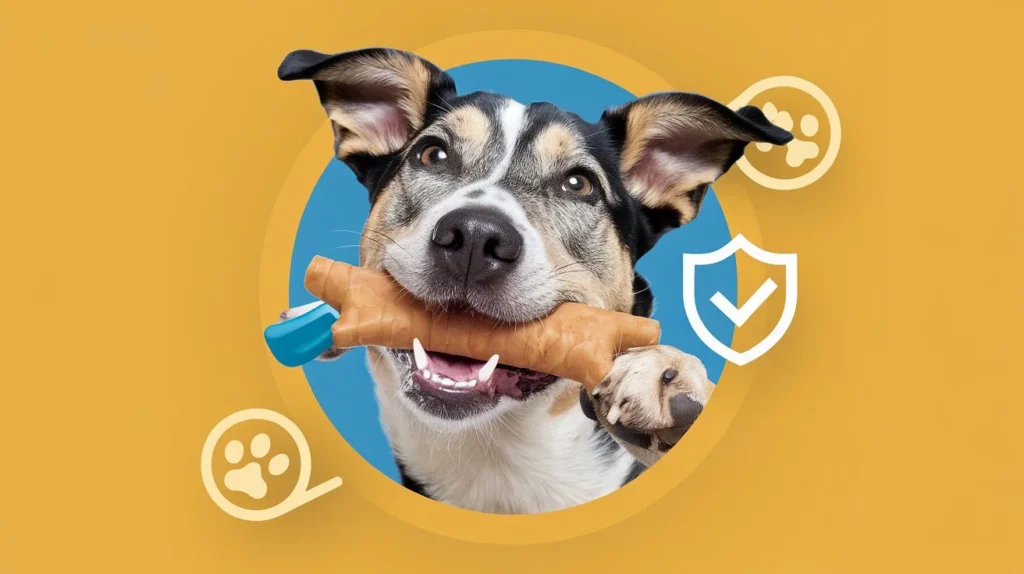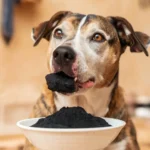Are yak chews safe for dogs? This question has been on the minds of many pet owners looking for healthy, long-lasting treats for their furry friends. In this comprehensive guide, we’ll explore the safety, benefits, and potential risks of yak chews for dogs. We’ll also delve into related topics such as whether yak cheese chews are safe for dogs, if yak chews are safe for dogs’ teeth, and the safety of Himalayan yak chews and yak milk chews for our canine companions.
Understanding Yak Chews: What Are They?
Before elaborating on the safety aspect, let’s have a look at what a yak chew is and how it gets prepared. Yak chews, also called Himalayan chews or yak cheese chews, are a kind of dog treat that is hard and made from cheese; the place of origin is the Himalayas. Some of the ingredients that go into its preparation include yak milk, cow milk, lime juice, and salt. On being mixed, the product is processed, cut into shapes, and dried for a couple of weeks until it becomes hard enough to serve as a long-lasting chew for dogs.
The History and Origin of Yak Chews
Yak chews have a fascinating history that dates back centuries. Originally, these treats were made by the people of Nepal as a form of hard cheese for human consumption. Over time, they discovered that dogs also enjoyed these cheesy treats, leading to their popularity as a canine chew. The traditional recipe has been adapted slightly for modern production, but the core ingredients and process remain largely the same.
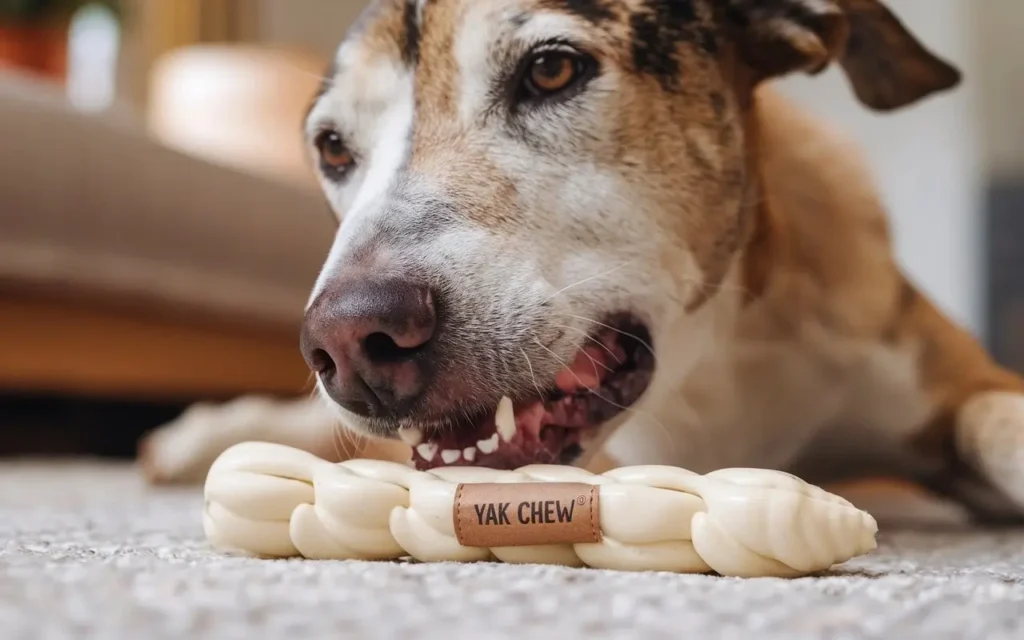
Are Yak Chews Safe for Dogs? Examining the Evidence
Now, let’s address the primary question: are yak chews safe for dogs? The short answer is yes, yak chews are generally considered safe for most dogs when used properly. However, as with any treat or chew, there are some important factors to consider.
Benefits of Yak Chews for Dogs
- Dental Health: Yak chews can help reduce plaque and tartar buildup, promoting better oral hygiene.
- Long-lasting: These chews typically last longer than many other dog treats, providing extended entertainment.
- Natural Ingredients: Made from simple, natural ingredients without artificial additives.
- Rich in Protein: Yak chews offer dogs an excellent protein source.
- Low in Fat: Unlike some other chews, yak chews are relatively low in fat content.
Potential Risks and Precautions
While yak chews are generally safe, there are some potential risks to be aware of:
- Choking Hazard: As with any hard chew, there’s a risk of choking if large pieces break off.
- Dental Damage: Extremely hard chews can potentially cause tooth fractures in some dogs.
- Digestive Issues: Some dogs may experience digestive upset if they consume large amounts quickly.
- Allergies: While rare, some dogs may be allergic to the ingredients in yak chews.
Are Yak Cheese Chews Safe for Dogs?
Many pet owners wonder specifically about the safety of yak cheese chews. Are yak cheese chews safe for dogs? The answer is similar to that of regular yak chews – yes, they are generally safe when used properly. Yak cheese chews are essentially the same product as yak chews, with the cheese being the primary component.
Nutritional Benefits of Yak Cheese Chews
Yak cheese chews offer several nutritional benefits for dogs:
- High-quality Protein: The cheese in these chews provides essential amino acids.
- Calcium: Cheese is a good source of calcium, supporting bone health.
- Low Lactose: The processing of yak milk reduces lactose content, making it more digestible for dogs.
Choosing the Right Yak Cheese Chew for Your Dog
When selecting a yak cheese chew, consider the following:
- Size: Choose a chew appropriate for your dog’s size to minimize choking risks.
- Hardness: If your dog is a senior or has dental issues, look for slightly softer varieties.
- Quality: Opt for reputable brands that use high-quality ingredients and manufacturing processes.
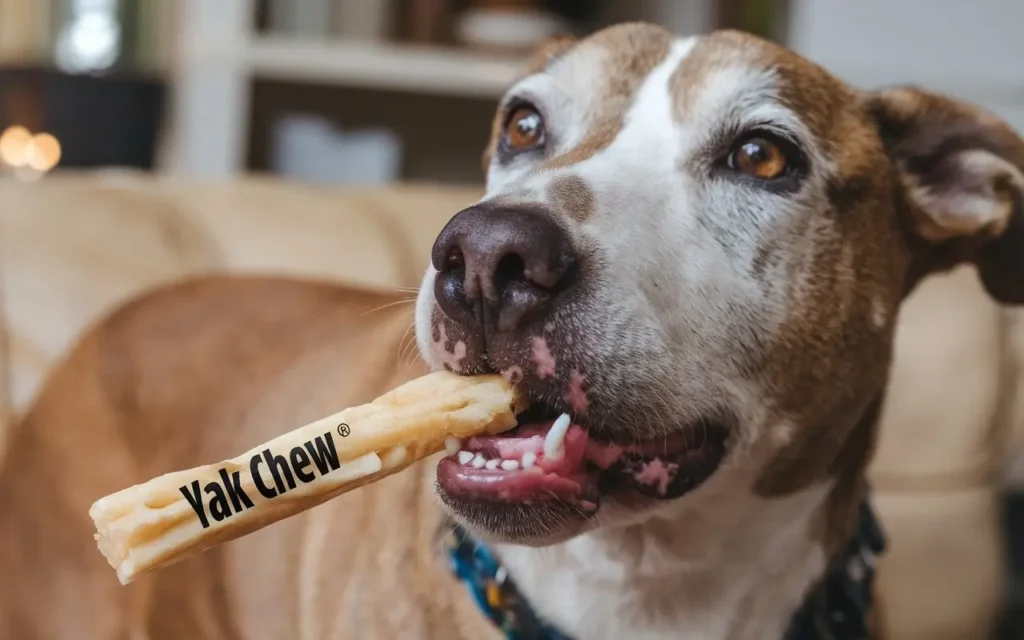
Are Yak Chews Safe for Dogs’ Teeth?
A common concern among pet owners is whether yak chews are safe for dogs’ teeth. Are yak chews safe for dogs’ teeth? The answer is generally yes, but with some caveats. While yak chews can provide dental benefits, their hardness can pose risks to certain dogs.
Dental Benefits of Yak Chews
- Plaque Reduction: The act of chewing helps scrape away plaque from teeth.
- Tartar Prevention: Regular chewing can help prevent tartar buildup.
- Gum Stimulation: Chewing on yak chews can promote healthy gum circulation.
Potential Dental Risks
- Tooth Fractures: Extremely hard chews can potentially cause tooth damage in some dogs.
- Wear and Tear: Excessive chewing on hard surfaces may lead to tooth wear over time.
Tips for Safe Use to Protect Your Dog’s Teeth
- Supervision: Always supervise your dog when giving them a yak chew.
- Softening: Some owners choose to briefly microwave or soak the chew to slightly soften it.
- Regular Dental Check-ups: Maintain regular veterinary dental exams to monitor your dog’s oral health.
Are Himalayan Yak Chews Safe for Dogs?
Himalayan yak chews are a popular variant of yak chews. But are Himalayan yak chews safe for dogs? These chews are essentially the same as regular yak chews, with the name highlighting their origin in the Himalayan region. They share the same safety profile as other yak chews.
What Sets Himalayan Yak Chews Apart?
- Traditional Recipe: Many Himalayan yak chews claim to use traditional Nepalese recipes.
- Altitude Factor: Some believe that the high-altitude environment affects the milk’s quality.
- Cultural Significance: These chews often carry a story of cultural heritage.
Choosing and Using Himalayan Yak Chews
- Authenticity: Look for brands that provide information about their sourcing and production methods.
- Size Variety: Himalayan yak chews are typically available in multiple sizes to accommodate various dog breeds.
- Storage: Store in a cool, dry place to maintain the chew’s quality and hardness.
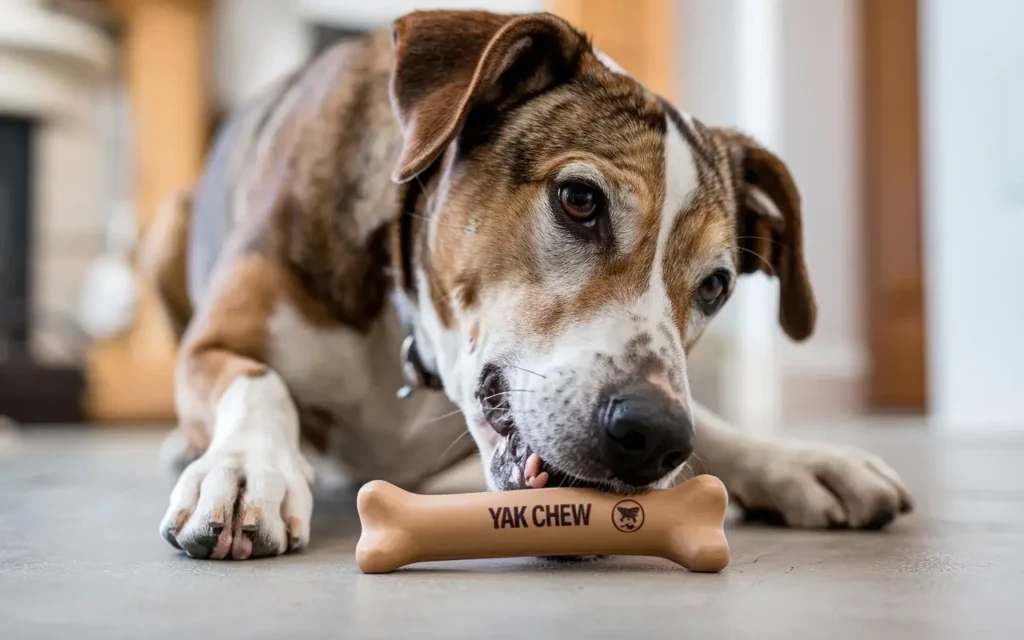
Are Yak Milk Chews Safe for Dogs?
Another variation that pet owners inquire about is yak milk chews. Are yak milk chews safe for dogs? Yak milk chews are essentially the same product as yak chews or yak cheese chews, with the term emphasizing the primary ingredient – yak milk.
Understanding Yak Milk in Dog Chews
- Nutritional Profile: Yak milk is rich in protein and contains beneficial fatty acids.
- Low Lactose: The processing of yak milk for chews reduces lactose content, making it more digestible for dogs.
- Natural Preservatives: The salt used in the production process acts as a natural preservative.
Benefits of Yak Milk Chews for Dogs
- Digestibility: Many dogs tolerate yak milk chews well due to the low lactose content.
- Nutrient-Dense: Yak milk provides a good balance of proteins, fats, and minerals.
- Long-Lasting: The hardness of yak milk chews makes them a durable treat option.
How to Introduce Yak Chews to Your Dog Safely
When introducing any new treat, including yak chews, it’s important to do so gradually and safely. Here are several suggestions to facilitate a seamless introduction:
- Start Slow: Give your dog small amounts initially to see how they react.
- Observe Closely: Watch for any signs of digestive upset or allergic reactions.
- Limit Chew Time: Initially, limit chewing sessions to 10-15 minutes.
- Proper Storage: Keep yak chews in a cool, dry place to maintain their quality.
Alternatives to Yak Chews for Dogs
While yak chews are safe for many dogs, they may not be suitable for all. Here are some alternatives to consider:
- Dental Chews: Specially formulated for oral health.
- Rubber Chew Toys: Durable and safe for aggressive chewers.
- Carrots or Apple Slices: Natural, low-calorie chew options.
- Bully Sticks: Another natural chew option, but higher in calories.
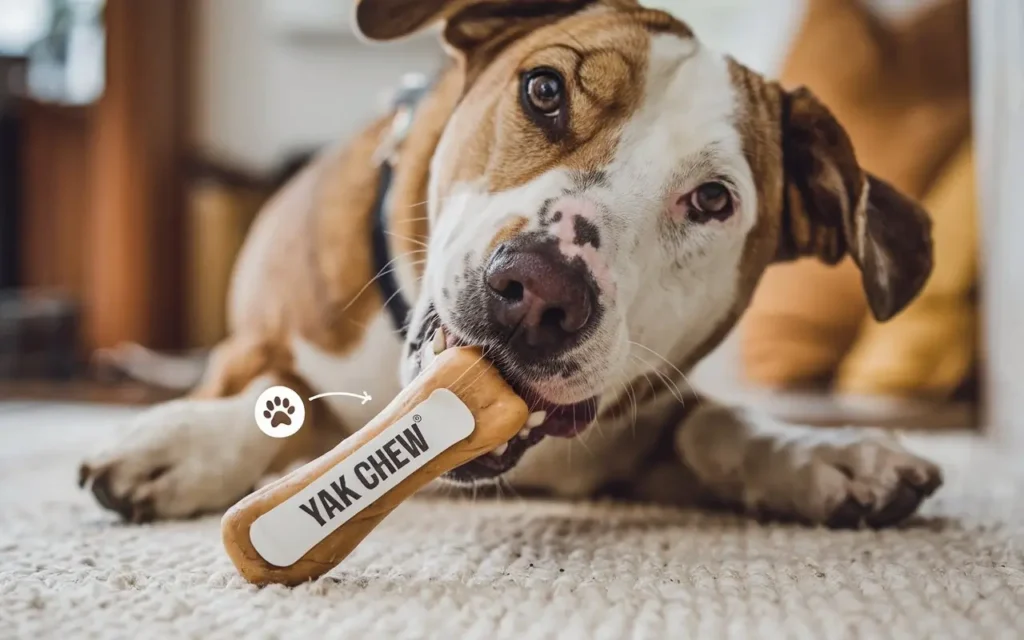
Frequently Asked Questions : Yak Chews for Dogs
To address common concerns, let’s look at some Common Inquiries Regarding Yak Chews for Dogs:
Q1: How long do yak chews last?
A: Yak chews can last anywhere from a few hours to several weeks, depending on the size of the chew and your dog’s chewing habits.
Q2: Can puppies have yak chews?
A: While yak chews are generally safe for adult dogs, puppies should be given softer alternatives until their adult teeth have fully developed.
Q3: What should I do if my dog swallows a large piece of yak chew?
A: If your dog swallows a large piece, contact your veterinarian immediately. In some cases, the piece may need to be removed to prevent intestinal blockage.
Q4: Are yak chews suitable for dogs with allergies?
A: Yak chews are often a good option for dogs with allergies, as they contain limited ingredients. However, if your dog has a dairy allergy, yak chews may not be suitable.
Q5: How often can I give my dog a yak chew?
A: Yak chews should be given in moderation, typically a few times a week. Always follow the recommended guidelines on the package and consult with your veterinarian.
Conclusion: Making an Informed Decision About Yak Chews for Your Dog
In conclusion, are yak chews safe for dogs? The answer is generally yes, when used properly and with appropriate supervision. Yak chews, including yak cheese chews, Himalayan yak chews, and yak milk chews, can be a beneficial and enjoyable treat for many dogs. They offer dental benefits, long-lasting entertainment, and a good source of protein.
It’s essential to keep in mind that each dog is different. What works well for one may not be suitable for another. Always consider your dog’s individual needs, chewing habits, and any existing health conditions when introducing new treats like yak chews.
As a responsible pet owner, it’s essential to supervise your dog during chewing sessions, choose appropriately sized chews, and be aware of potential risks. Regular check-ups with your veterinarian can help ensure that your dog’s dental health remains in top condition, regardless of the chews you choose.
Ultimately, the safety and enjoyment of yak chews for your dog depend on proper selection, introduction, and usage. By following the guidelines and tips provided in this comprehensive guide, you can make an informed decision about whether yak chews are the right choice for your furry friend. Remember, your dog’s health and happiness should always be the top priority when selecting treats and chews.

